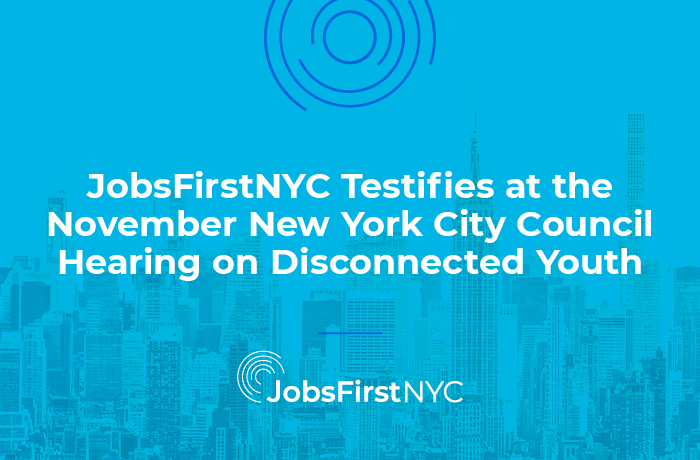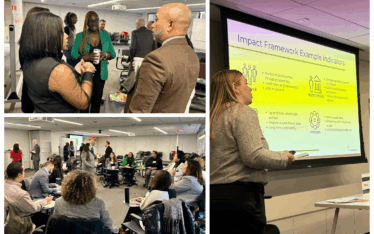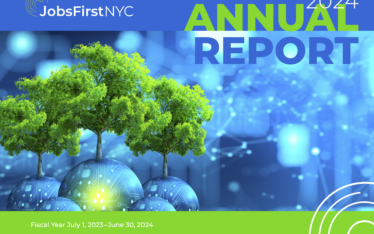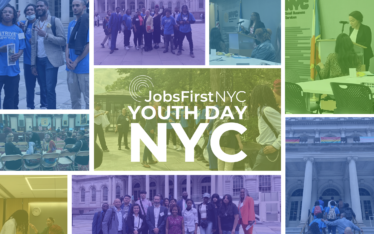Youth Services Committee Hearing on Oversight – Disconnected Youth: Out of Work and Out of School
Int. No. 708 and Int. No. 709
Good afternoon, Chairman Eugene and other distinguished Council Members of the Youth Services Committee. My name is Marjorie Parker and I am the Deputy Executive Director at JobsFirstNYC, a neutral intermediary focused on the issues of young adults who are out of school and out of work or underemployed.
For several years, JobsFirstNYC has been documenting the number of out-of-school, out-of-work young adults in New York City. Today, this includes more than 184,000 New Yorkers between 16 and 24 years old. Our work as an intermediary includes convening and connecting young adults, service providers, policymakers, public officials, philanthropy leaders, businesses, and advocates to improve outcomes for young adults and develop strategies to sustain our city’s future workforce.
As an organization committed to collecting data, creating and lifting up effective practices, and convening cross-system actors to benefit out-of-school, out-of-work young adults, those who serve them, and those who employ them, we support Intro 708 for the creation of a “disconnected” youth task force. We also recommend the development of a standing Advisory Council to advise the Mayor and City Council on issues surrounding this population indefinitely.
In addition to the stakeholders outlined in the bill’s Introduction, we recommend the inclusion of the following stakeholders:
· Policy-focused intermediaries like JobsFirstNYC, United Neighborhood Houses, and Community Service Society; and, youth workforce private funders who have experience collaborating with providers to advance practice and policy for this population.
· Representatives from CUNY and the business communities, as including their voices is integral in any effort designed to propel young people towards sustainable economic prosperity.
· Young adults, community-based organizations, local and national systems-level actors both separately and together to offer feedback on the effectiveness of existing public programs for this population and to provide recommendations to guide the content and scale of any future investments.
We support the creation of any workforce development division dedicated to connecting out-of-school, out-of-work young adults to training and employment opportunities if it is targeted at reaching those young jobseekers who are not currently being served under OSY, as such, we conditionally support Introduction 709. Recent NY State Department of Labor data shows that DYCD WIOA contracts for Out of School Youth (OSY) programs have better education, employment, and certification outcomes than those achieved by the State overall, so clearly the agency is doing great work here with the population it serves. However, we think any effort to serve larger number of OSYs cannot be dismissed.
As such, we present the following conditional questions and recommendations:
· How would this new division be different from what Department of Small Business Services (SBS) does through its new young adult programming in the Workforce1 Centers? <
We urge the city to conduct a thorough review of the wide range of existing centers designed to serve young adults and other vulnerable youth populations, as options for serving more young adults who are out of school and out of work. The current centers include, but are not limited to:
o the new SBS/HRA/DOE West Farms Workforce1 Career Center for young adults;
o the Neighborhood Opportunity Network (NeON) Centers;
o the Manhattan District Attorney’s Office’s CUNY proposals to develop Youth Opportunity Hubs in Harlem, Washington Heights, and the Lower Eastside. While we were among the first advocating for these centers in our 2014 policy paper, the exponential growth of these mechanisms requires the city to evaluate and coordinate them to create efficiencies so that those with the highest needs are being served.
Furthermore, what system-level impact would result from the development of this new division – would it increase or decrease collaboration among SBS, DYCD, CYE, DOE, CUNY, and the Office of Workforce Development? The department has historically catered to older, higher-functioning, “work-ready” jobseekers. We recommend that SBS could best serve the jobseekers who still lack services through bilateral agency agreements, including some of the following examples:
· Co-enrolling students in both OSY and SBS programs, so those seeking only employment have direct access to SBS services; Uncouple penalties related to co-enrollment.
· Working with the Office of Adult and Continuing Education to serve more 21- to -24-year-olds, increasing their access to employment; and,
· Partnering with workforce unit in CUNY to direct qualified college students to employment opportunities through the SBS mechanisms.
We recommend that the Council consider these additional actions that can reach more out of school, out of work young adults.
· Explore expanding the services of Pathways to Graduation/District 79 to serve young people up to age 24; This could lead to greater amount of OSOW gaining access to education and employment services
· Enhance and expand resources to support current existing OSY programs to serve more young adults and provide additional post-program supports.
We believe that the creation of any new division should be under the purview of the department or departments with the experience and knowledge necessary to support out-of-school, out-of-work young adults at all levels who need a variety of training, education, bridging, and placement options. We also believe that any new division should target its resources towards the vast number of out-of-school, out-of-work young adults who are not currently receiving support through the array of other programs already available through DYCD and SBS.
Thank you,
Marjorie Parker
Deputy Executive Director, JobsFirstNYC





